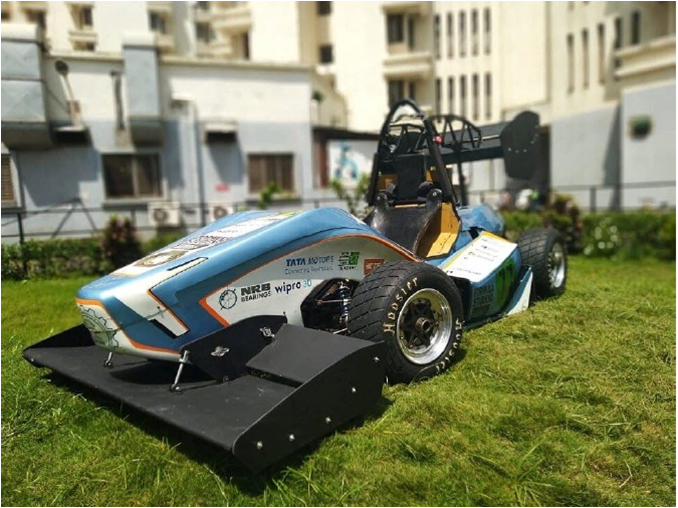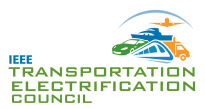IIT Bombay Racing – Facing COVID-19
The COVID pandemic is one of the largest challenges society has faced in modern history. It has deeply affected people, organizations, and institutions. These times call for drastic restructuring of our actions and thriving environments in order for us to realize our goals. To channel through, we rely on the persisting human spirit to adapt and conquer. The world has taken significant strides in face of adversity to restore normalcy. We, at IITB Racing, feel honored to share our endeavors towards the same.
Formula Student is an international, university-level, racecar-building competition. It is a one-of-a-kind platform for students to learn and exercise practical engineering. Here, IIT Bombay Racing represents our university every year. We're a group of 70 students across all years and departments that dedicate our time and effort to compete in Formula Student by building the best electric racecar. While winning competitions is one of the goals for the team, we also aim to develop technology that will bring us one step closer to making electric vehicles more accessible.
IIT Bombay Racing is our institute's oldest tech team, working since 2007. When we first started taking part in Formula Student, the team focused on building combustion vehicles. We had many successes with our cars Vayu (2008), Agni (2009), Prithvi 2.0 (2009) and Prithvi 3.0 (2012). Each of these cars gained recognition for their exceptional performance in one way or another. In 2012, IIT Bombay Racing launched India's first electric racecar: Evo 1.0. This launch marked the team's transition from combustion vehicles to electric vehicles. Since then, we've competed exclusively in the EV category at Formula Student with the EVo 2.0, EVo 3.0, EVo 4.0, Orca and EVoX. Our latest build: EVoK, has been a grand success. It boasts in-house fabricated lightweight carbon fibre bodyworks capable of generating a downforce that is 2.87 times that of a Porsche GT3 RS 991. Driven by high-power brushless DC motors it can reach 0-100kmph in just 3.1 seconds.
EVoK Specifications
● Weight: 241 kg
● Max Motor Torque (each): 80 Nm
● Peak Motor Power (each): 40 kW
● Cell Configuration: 96S1P
● Max Voltage: 403 V
● Time 0-100 km/hr: 3.10 sec
● Top speed: 163 Kmph
Achievements
- Achieved 1st position in the engineering design event of Formula Student UK 2020, the first team from the country to earn this accomplishment
- Secured 4th position among all-electric vehicles in Formula Student UK, the best rank by any Indian team
- In-house fabricated lightweight Carbon Fibre bodyworks
- Implemented in-house resin infusion for accumulator manufacturing for the first time in any car in the team's history
- Implemented 3-D printed Titanium uprights, self-made Aerodynamics package and built an in-house battery management system
The COVID-19 pandemic hit as we began preparations for manufacturing our next car: E12. Initially, the institute decided to send us home for a short break of 2 weeks in compliance with the government's orders. During this time, the team spent a week analysing the possible future outcomes. We'd hoped to get back to the institute and resume building E12 in 2 weeks, but also prepared for the scenario of a complete lockdown. Since manufacturing was out of the discussion, the spotlight turned to research and development. The team utilised the newfound lockdown time to explore new possible technologies and their implementation in E12. We revisited the fundamentals and improved the base concepts on which we built the car.
Working through COVID, however, was hardly a walk in the park. The team tirelessly developed new ways to work around the challenges it posed. The worst-struck was the ideation phases. A team ideates most efficiently when communication is clear, quick and concise. Doing the same in a socially distant, virtual environment demanded a significant learning curve. But it wasn't all bad. The increased dependency on virtual workspaces has improved documentation, the flow of information and, by necessity, the frequency of team meetings. The team believes that this period has allowed them to rethink every aspect of an IIT Bombay Racing racecar from design, construction to race day features. It has also allowed for more virtual testing than ever, utilising various software wherever possible.
Even as the COVID situation hadn't improved, FSUK (Formula Student UK) was unwilling to cancel the event. The organising authority announced that the 2event was going to be virtual. That meant all teams could take part in the event without actually travelling to Silverstone. The drawbacks, however, were that the cars they spent so much time building would not race. Even though the competition was virtual, all the time and efforts the team put in were real. And our efforts were not for nought. At FSUK 2020, the IITB Racing team did spectacularly, winning 1st place in the Engineering Design presentation and 4th overall. This triumph would not have been possible without the structured and exhaustive timelines that aided our preparation.
Owing to the virtual nature of the reboot phase post-lockdown, the team enjoyed more alumni and industry input than ever before. Alongside this, the team was free to explore possibilities of a monocoque chassis, regenerative braking and the self-development of motors and power electronics. In the past few months, we've been slowly able to restart E12's manufacturing. We are gradually increasing the number of people working hands-on with E12 and hope to have the entire team on-site soon. It is exciting to bring the winner of the 2020 Design Presentation to life. We can't wait for it to dominate the races as well. We target a quick manufacturing phase with brand new motors and hope to have a long testing period. Our current goal is to push our performances at FSUK 2021. Parallelly, we are also aiming to implement the research that we invested in during the lockdown.
As the number of COVID cases continue to fall, hope rises. Like the rest of the student community, we hope that our burning passion and unyielding spirit will help us stand the test of time and face whatever challenges our futures hold.

IIT Bombay Racing’s EvoK
Authors
 |
Jagadish A. is the Junior Design Engineer for the battery subsystem at the IIT Bombay Racing team. He is currently a sophomore undergraduate in Aerospace Engineering at the Indian Institute of Technology Bombay, India. Alongside his co-JDEs he designs and manufactures the high voltage battery that powers the team’s car. His other duties involve leading the preparation and presentation of the Business Plan at Formula Student competitions. |
 |
Shaurya Sarna is the Project Manager at the IIT Bombay Racing team. He is a senior undergraduate in mechanical engineering at the Indian Institute of Technology Bombay, India. Starting as a junior design engineer in the battery systems, he has designed and manufactured a high voltage battery for an FSAE electric race car. As a project manager in his final year of undergraduate studies, Shaurya is responsible for setting up team targets, timelines, and finances. His research interests lie in batteries and energy storage. |
About the Newsletter
Editors-in-Chief

Jin-Woo Ahn
Co-Editor-in-Chief

Sheldon Williamson
Co-Editor-in-Chief
TEC Call for Articles 2023 - Advances in Charging Systems
The TEC eNewsletter is now being indexed by Google Scholar and peer-reviewed articles are being submitted to IEEE Xplore.
To submit an article click here.


